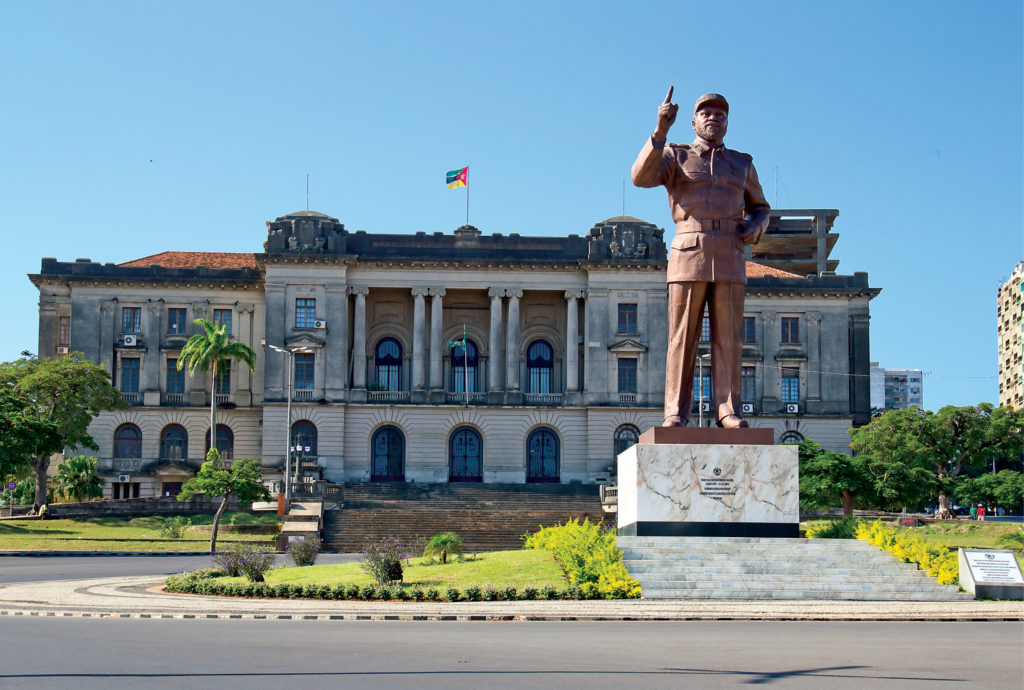“I am the bee that will make honey for all,” said Filipe Nyusi at a rally just before winning the 2014 presidential election in Mozambique. The busy bee is a talisman for one of the poorest countries on the planet which has, against the odds, experienced a remarkable economic surge in the last decade through sheer hard work and dogged determination.
The authors of the Lonely Planet guide to Mozambique describe the country as Africa’s best kept secret. They urge travellers to experience its 1,500 miles of unspoilt Indian Ocean coastline and enjoy the African, Arabic, Persian, Indian, and Portuguese cultural influences on food, music, and art. Travelers are advised to do so “before word gets out.”
Lonely Plant’s reporters depict a tropical paradise with an upbeat atmosphere, overflowing markets, and great tourism potential. This view was reinforced by Henning Mankell, the late Swedish crime thriller writer and author of the Wallander books, who spent some time in Mozambique: “The wonderful Mozambican people have endured tremendous misery without losing their dignity and their positive outlook on life. Moreover, they have not lost their will to progress and develop. Mozambique is a country where the people never surrendered.”
Great Hopes
It’s certainly true that Mozambique is among the continent’s great hopes, having bucked the post-colonial trend in the last decade, emerging from a long and destructive civil war and economic chaos. It is still, however, a long way from being a paradise.
Mozambique, an isolated outpost and remnant of Portugal’s overseas territories ringed by former colonies of the British Empire, fought a bitter battle for freedom, finally ending subjugation to far-away Lisbon in 1975. A Marxist-Leninist state was duly erected and received considerable support from Cuba and the Soviet Union. Economic collapse followed and led, almost inevitably, to civil strife.
The struggle between the Marxist Frelimo movement and Renamo – the anti-communist guerrilla group that enjoyed the support of white South Africa and neighbouring Rhodesia in the early 1970s – went on for seventeen years. The country emerged from its civil war thoroughly devastated.
The eventual peace agreement of 1992 has, by and large, held firm, though Renamo fighters “in the bush” continue to carry out sporadic attacks on government premises and convoys despite the “final” peace agreement of 2014.
Mozambique, while still one of the world’s poorest nations, is Africa’s fastest-growing economy, with GDP growing at a rate of approximately 7.5% annually. Only ten years ago, international creditors wrote off $6 billion of loans to the country as part of the Heavily Indebted Poor Countries (HIPC) initiative. Since then, Mozambique has striven to root out corruption, passing new anti-graft laws in 2012; it also completely restructured the country’s legal and fiscal frameworks with a view to increasing revenues and improving the business climate.
The main drivers of growth are public expenditure and foreign investment. The country’s objective is to remain attractive to foreign investment while juggling its debt. Public debt currently stands uncomfortably at more than 50% of GDP.
The Maputo Development Corridor – a reinvigorated road and rail link from the capital to South Africa’s northern provinces which has seen $5 billion worth of industrial investment in the last ten years – is also a testament to the resolve of Mozambicans to fight their way out of poverty. Mozambique’s continued growth would seem to be ensured by the recent discovery of vast natural gas fields off the northern coast. There have even been cases of retro-migration whereby Portuguese citizens, fleeing their own country’s troubled economy, have emigrated to Mozambique to set up businesses.

Avoiding the Resource Curse
Some observers are now voicing concern. Elisabete Azevedo-Harman, a research fellow at Chatham House and an expert on Mozambique, says: “Major new gas and mineral finds promise a shot at greater prosperity, but also hold the threat of a resource curse.”
The term was coined in the early 1990s to describe the paradox of countries rich in natural resources but unable to convert their boosted revenues into a general economic wellbeing, seeing a rise in corruption instead.
The curse appeared to be evident when, in April this year, the Mozambique government disclosed previously hidden, government-guaranteed loans exceeding $1 billion to state defence and security companies.
The International Monetary Fund (IMF), which has been working with the government in Maputo to help it repay a previously undisclosed debt, suspended a second instalment of a multimillion dollar loan to the country. IMF Managing-Director Christine Lagarde said there was more than a whiff of corruption about the loans scandal.
The cut in foreign aid, combined with a fall in global prices for some of Mozambique’s export staples, has led to a foreign exchange crunch. The Mozambican metical has fallen heavily against the South African rand. Because South Africa provides most of Mozambique’s imported food, the devaluation has caused food prices to rise sharply.
The root problem affecting Mozambique is, quite simply, poverty. More than 75% of the population lives in the rural areas of the country and, of those, many are subsistence farmers, surviving on the proceed of a single hectare of land and a hoe – not unlike their grandparents did before them. The huge state-owned farms of the early Marxist-Leninist period were neither productive nor profitable. The massive commercial farms of the capitalist era also disappoint.
Chickens and Beer
The recent book Chickens and Beer: A Recipe for Agricultural Growth in Mozambique, co-authored by Joseph Hanlon and Teresa Smart, points to a possible solution to the farming dilemma. “It is always assumed that bigger mechanised farms are more efficient than smaller ones,” write the authors. “But research shows that for farming there are few economies of scale and that smaller plots can be as productive as large ones.”
The chickens and beer of the book’s title refer to the number of small and medium-sized agricultural businesses that have blossomed producing these two commodities. Cotton and tobacco, two of the country’s biggest exports, are also farmed in the main by similarly small commercial farmers, not big foreign-owned plantations.
But these new agriculture SMEs (small and medium-sized enterprises), which could help eradicate rural poverty, need financial support to get off the ground, say the authors. General economic success will not happen unless there is a fundamental restructure of the country’s agricultural sector.
Currently, life expectancy for men is just about fifty years, while women on average can expect to live only two years longer. Four out of ten people have are infected with HIV. While the country is mainly Christian, many people, particularly outside the towns and cities, still believe in witchcraft. Every year there are reports of dozens of people being lynched as witches in the countryside.
Some commentators see a link between the belief in witchcraft and the economy. The victims of village reprisals are invariably old people whom the younger members of the community accuse of “casting spells” to ruin their chances of employment.
Despite the many hurdles that lie ahead, however, Mozambique is pinning its hopes on the newly-discovered off-shore natural gas deposits. The hope is that foreign companies will flock to Mozambique, despite the current debt crisis.
Nevertheless, President Nyusi has, so far, retained the confidence of foreign investors. He will now need to become a very busy bee indeed to steer his country back on track.





























